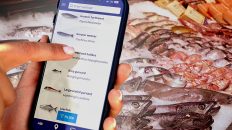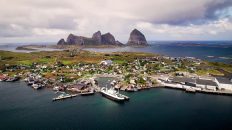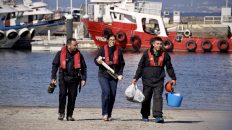From underwater archaeology to whale-watching tours led by actual scientists, Europe’s Atlantic islands demonstrate how tourism can protect rather than destroy natural and cultural heritage of the ocean.
Summer is the peak season for seaside holidays across Europe, but this year the celebrations are mixed with protests. From Barcelona to Venice, locals are taking to the streets, demanding limits on mass tourism that they say is destroying coastal environments and erasing historical heritage.
But on Faial, one of the Azores islands in the middle of the Atlantic, they are taking a different approach. Rather than flooding the island with tourists at all costs, local authorities and professionals of the sector want to foster eco-tourism, attracting visitors who appreciate and respect the natural and cultural heritage of the archipelago.
An international group of scientists, working in the EU-funded ecoRoute project, is preparing coastal sites that can be made accessible to snorkellers and scuba divers whilst promoting underwater heritage and preserving these sites for the future.
Underwater heritage as eco-tourism magnet
Until recently, sites like these were largely ignored. “Often, such archaeological sites aren’t treated as heritage — they’re just seen as wrecks. People don’t know about them,” explains José Bettencourt, an archaeologist from Universidade NOVA de Lisboa working on the ecoRoute project.
The project receives funding from the European Maritime, Fisheries and Aquaculture Fund and focuses on fostering underwater cultural tourism in Europe’s outermost regions. Rather than closing the sites to tourists, it is turning them into sustainable attractions that educate visitors about Atlantic maritime history.
Ana “Zuga” Besugo, a marine biologist and nature guide, sees the appeal for her customers. “These are people who want to learn about the island’s history and nature,” she says. “So I think it’s really valuable for us to share this message with our visitors.”
Whale watching: when science meets tourism
A thousand kilometres south in Tenerife, the Canary Islands are tackling a similar challenge. These waters host a third of all whale and dolphin species on Earth, making whale-watching tours big business. But marine biologist Misael Morales Vargas has chosen to keep his company’s environmental footprint minimal.
Unlike large commercial vessels, Morales’s company Biosean uses quiet inflatable boats that do not disturb the animals. With just a small group aboard, everyone can hear his detailed explanations. The real magic happens when he deploys a hydrophone—an underwater microphone that lets tourists hear whale clicks and whistles as they happen.
“There is an environmental emergency, and we need to create opportunities like this that can change mentality of people that can then see nature as part of us, not as something isolated”, Morales Vargas explains.
This approach is part of the TWINNEDbySTARS project, another EU-funded initiative transforming seaside holidays from noisy attractions into meaningful experiences. “We really appreciate the focus on sustainability and how the animals are treated here. It’s much nicer than the kind of mass tourism you see elsewhere,” notes one visitor.
Back in Faial in the Azores, whale-watching company Naturalist — Science & Tourism, taking part in the same project, has made scientific research part of their daily tours. Certified marine biologists aboard record every wildlife encounter and collect samples such as whale skin particles, and this data goes to research institutes.
“We want to be models, to try to create products that also other companies can use to potentiate these links between science and tourism,” explains Naturalist’s marine biologist Gisela Dionísio. This collaboration cuts field study costs whilst giving tourists a front-row seat to real marine science.
The bigger picture
The sea-friendly tourism movement comes at a crucial time. Coastal tourism represents the biggest sector in Europe’s blue economy, accounting for more than half its jobs and over 200 billion euros in revenue.
“Here we have a great opportunity to look at what has happened in other parts of the world and try not to repeat the same mistakes,” says Gilberto Carreira, Director of Biodiversity Services and Marine Policy for the Azores. “Everyone recognises the need to develop tourism in a sustainable way.”
The Azores have already protected 30% of their waters, and projects like ecoRoute and TWINNEDbySTARS are helping maintain this protection whilst building a thriving tourism industry.
Even beach tourism is evolving. As marine researcher Carla Dâmaso points out, “We are facing climate change, pollution, and even mass extinction events. But right now, it’s still possible for us to change our behaviour and, in some way, help make things better.”
Sometimes the solution is as simple as tourists picking up litter as they walk along the beach. These small actions, multiplied across thousands of visitors, can keep coasts beautiful and marine life safe.
Across the globe, poorly managed seaside tourism continues to pollute coasts and threaten marine life. But the Atlantic islands are proving there’s another way—one where we can enjoy the ocean whilst keeping it safe for future generations.





